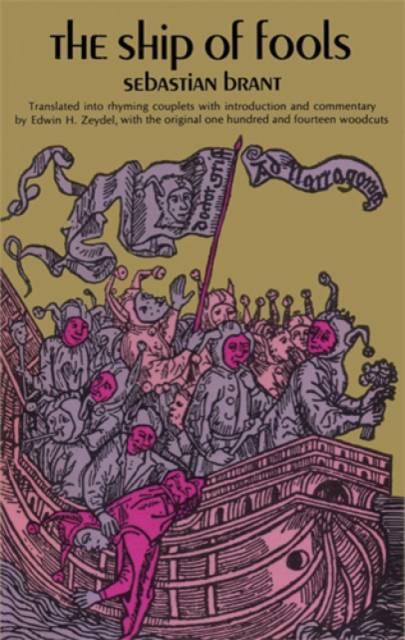
- Afhalen na 1 uur in een winkel met voorraad
- Gratis thuislevering in België vanaf € 30
- Ruim aanbod met 7 miljoen producten
- Afhalen na 1 uur in een winkel met voorraad
- Gratis thuislevering in België vanaf € 30
- Ruim aanbod met 7 miljoen producten
Zoeken
€ 41,95
+ 83 punten
Uitvoering
Omschrijving
Published in 1494 in Basel, The Ship of Fools was soon translated into every major European language. It provoked a vast number of imitations and remained steadily in print through the eighteenth century (with sporadic reprints after that). It still possesses an enormous vigor and vitality.
The book owes its long life to an imagination, wit, and humor rich with insights into human nature, yet neither bitter nor namby pamby. Its commentary on the boasting, pedantry, false learning, gambling, gluttony, medical folly, adultery, greed, envy, hatred, pride and other failings that mark humanity are sharp and telling, and, sadly, as relevant today as they were 450 years ago.
This translation by Professor Edwin H. Zeydel is the only accurate English translation ever published. (Barclay's version is really a pastiche written in imitation of Brant.) The form Professor Zeydel uses is verse, like the original, and he even retains the original rhyme scheme and meter. The achievement is remarkable, for it captures all the charm and movement of the original German while sacrificing nothing to readability and fluidity.
Published now with the 114 original Renaissance woodcuts and with Professor Zeydel's annotations, a biography of Brant, a publishing history, and a survey of the work's influence, this will unquestionably remain the definitive edition of The Ship of Fools in English. The illustrations are part of Dover's Pictorial Archive Series and may be used by commercial artists free of charge.
The book owes its long life to an imagination, wit, and humor rich with insights into human nature, yet neither bitter nor namby pamby. Its commentary on the boasting, pedantry, false learning, gambling, gluttony, medical folly, adultery, greed, envy, hatred, pride and other failings that mark humanity are sharp and telling, and, sadly, as relevant today as they were 450 years ago.
This translation by Professor Edwin H. Zeydel is the only accurate English translation ever published. (Barclay's version is really a pastiche written in imitation of Brant.) The form Professor Zeydel uses is verse, like the original, and he even retains the original rhyme scheme and meter. The achievement is remarkable, for it captures all the charm and movement of the original German while sacrificing nothing to readability and fluidity.
Published now with the 114 original Renaissance woodcuts and with Professor Zeydel's annotations, a biography of Brant, a publishing history, and a survey of the work's influence, this will unquestionably remain the definitive edition of The Ship of Fools in English. The illustrations are part of Dover's Pictorial Archive Series and may be used by commercial artists free of charge.
Specificaties
Betrokkenen
- Auteur(s):
- Uitgeverij:
Inhoud
- Aantal bladzijden:
- 416
- Taal:
- Engels
- Reeks:
Eigenschappen
- Productcode (EAN):
- 9780486257914
- Verschijningsdatum:
- 8/12/2011
- Uitvoering:
- Paperback
- Formaat:
- Trade paperback (VS)
- Afmetingen:
- 138 mm x 216 mm
- Gewicht:
- 421 g

Alleen bij Standaard Boekhandel
+ 83 punten op je klantenkaart van Standaard Boekhandel
Beoordelingen
We publiceren alleen reviews die voldoen aan de voorwaarden voor reviews. Bekijk onze voorwaarden voor reviews.











